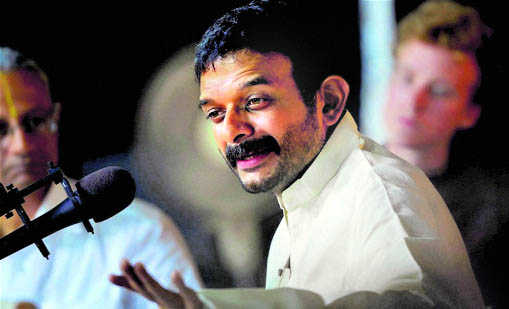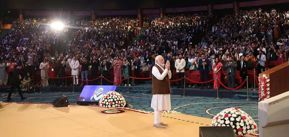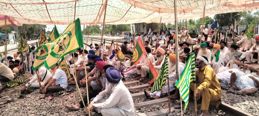
TM Krishna became a critic of his own art as well as of the system that controls art forms. PTI
Vandana Shukla
IT can only be a happy coincidence that T M Krishna, Carnatic musician, and Bezwada Wilson, campaigner against manual scavenging, have been selected for this year's Ramon Magsaysay Award, from India. Both are, in their own ways, challenging the caste hierarchy. Krishna is changing the political context of culture in consonance with the changing times; by questioning the exclusiveness of the classical art form he practises-Carnatic music.
Most musicians are not critics; Krishna, 40, became a critic of not only his own art, but also a well-defined system that controls and sustains the classical art forms. Labelled as a rebel, argumentative, haughty and westernised, it would have been easy for him to sit on his laurels as a successful Carnatic musician. Born in a rich Tamil Brahmin family, he remained under the tutelage of masters like Bhagavathula Seetharama Sharma, Ragam Thanam Pallavi, Chengalpet Ranganathan and the late Semmangudi Srinivasa Iyer. He gave his first concert at 12, and came to be known for his sonorous voice and for following strict forms of Carnatic classical music. His "profoundly moving" concerts received great reviews. Did he throw it all away, when he boycotted the annual December music festivals (kutcheri) held in Chennai, rejecting the conservative tradition, that does not include other forms of music and also prohibits many non-Brahmins from performing.
It was not only a rejection of a certain festival, all festivals become repetitive, they do the same more or less; his objection was to the "exclusive cultural clubs" that breed lies about past and its glorious heritage. "Indian culture is bunkum," he said at Jaipur Literature Festival, in January, "It's a lie sold by these clubs; if you don't listen to Carnatic music, you are not cultured!"
Questioning the basis of the "exclusive clubs", that would have assured him bread, butter and glory, for the rest of his life, perhaps comes from his education at The School, an institution run by the J. Krishnamurti Foundation, that encourages challenging the established outlook towards life. "I am a representative of a 2000-year-old legacy, so I carry a certain asset, classical musicians don't like innovation, they would say all that is worth doing has been done already by masters before; innovation is taken as challenging the tradition."
The “purity’ of the classical forms is retained, based on two arguments; one, they are old. "The idea that its so 'old' is a lie, Carnatic music, as we know today is only 150-years old; ideas have been moved, deleted, changed, the music is not very old but we keep saying, and justification comes from the word 'old'." Krishna questions the very basis of the 'classic' foundation of the form of music he practises. Second, in the self-contained club of classical music, he says, exists a certain narrative of "experiencing" classical music, by putting it onto a pedestal that is 'pure and divine.' "The moment you attribute divineness to an experience, you take it beyond the realm of debate and any kind of socio-political argument. Listening to music can be a deep and moving internal experience, but the word 'spiritual' comes so easily to it; by using it repeatedly, another fraud is committed."
His argument is not against the music he practises, or any other classical art form, but against limiting the forms by their framing that distances them from their present socio-political contexts. For example, for years people were made to believe that neither women nor Dalits made any contribution to the classical art forms. When it was acknowledged, women were labelled as baijis or devdasis, while their male counterparts came to be known as Pandits and Ustads. “A composition of a devdasi is 'purified' by a master and presented as a part of this 'spiritual' music, this hypocrisy I object to,” is his argument.
To make people believe that cultures were syncretic in the past, is another lie. It has propagated the idea that we were living in harmony but certain 'foreign' forces disrupted it. Cultures have always been conflicting, but something beautiful emerges out of conflicts. Based on these arguments he wrote A Southern Music, drawing attention to caste and gender barriers in the world of Carnatic music,
The book triggered impassioned debates. Krishna is also a regular columnist, and his columns are followed by strongly opinionated people, from both sides of the caste and culture divide. His non-participation in kutcheri triggered reflection and a conversation. A young Sanskrit teacher, in Delhi, gathered courage to compose Bollywood songs in Sanskrit to motivate his students, crooning Monike Priyatama (Monika, my darling), which went viral, another professor of Hindustani classical music composed khayals in English, and received a few thousand hits. These innovations broadened the appeal of classical arts.
More than his non-participation, Krishna needs to be celebrated for his multi-faceted work, for giving music a humane, democratic and egalitarian face. Sumanasa Foundation, a non-profit organisation, founded by Krishna with S Hariharan and Maya Hariharan, supports and offers aid to the talented young students from underdeveloped rural areas. Jnanarnava, a trust set up by him, works for preservation of tradition by taking up audio archival of all musical compositions published in the Sangita Sampradaya Pradarshini, a publication on Carnatic music. Above all, he started a new music festival called Svanubhava, which creates access to various art forms, many unheard and non popular, cutting across class and caste barriers. In February this year, a beach in the centuries-old fishing village of Urur-Olcott Kuppam, in south Chennai, was converted into a concert venue for the Urur-Olcott Kuppam Marghazi Vizha, a Carnatic classical music festival, which was open to all - from fishermen and their families to people from neighbouring areas to experience a thillana or the adavus of Bharatanatyam. The idea was to "push out caste elitism from the existing Carnatic music system and unite various art forms." No one cared for the Kanjivaram silks, draped by traditional listeners of Carnatic music.



























